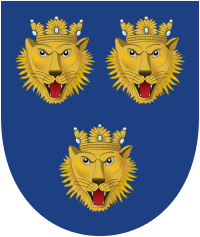Church of St. Nicholas, Nin
| Church of St. Nicholas | |
|---|---|
| Croatian: Crkva svetog Nikole | |
 | |
| Location | Nin |
| Country |
|
| Denomination | Roman Catholic |
| Architecture | |
| Functional status | Active |
| Style | Pre-Romanesque |
| Years built | 12th century AD |
| Specifications | |
| Length | 5.90 metres (232 in) |
| Width | 5.70 metres (224 in) |
| Height | 6 metres (240 in) |
| Materials | Stone |
| Administration | |
| Archdiocese | Zadar |
Church of St. Nicholas (Croatian: Crkva svetog Nikole) is a Pre-Romanesque style Roman Catholic church located in the field of Prehulje, one mile from Zadar, between Zaton and Nin. It was built on the earthen pyramid mound on top of the Liburnian prehistoric tomb. Church is the only surviving example of early Romanesque architecture in all of Dalmatia. It was built at the beginning of 12th century, and is dedicated to Saint Nicholas.
Description
Church of St. Nicholas was built in form of a fortress. It has a trefoil plan with four branches arranged around a central circular core, three of which form the apse, and the fourth the input branch. Its dome-shaped vault is reinforced with circular-ribbed arches above which were built 8 small towers with battlement as a lookout in the 16th or 17th century during Hundred Years' Croatian–Ottoman War . Under the dome are flanges that are resting on pilasters that are abutting onto the pylons between the apses. Input branche is rectangular and roofed with a mezzanine leaning on squinch, while three other branches of semicircular conch are translated with semicalotte. Church was built of small stones and has a smooth outer surface. It has extremely small dimensions; length: 5.90m, width: 5.70m, height= 6m.[1]
Visit of Priul in 1603
In year 1603, Church of St. Nicholas was visited by Priul who found neatly kept Glagolitic registers of baptisms and marriages, as well as two Glagolitic Missals. At the time of his visit, there was in parish Brotherhood of the Holy Spirit with 28 members. Priul ordered brotherhood to write its rules that had to be approved by the bishop.[2]
Legend
According to legend, seven Croatian Kings were crowned in the Church. After coronation they were obliged to ride with their escort to the church. There, they would be presented to the people, and, as a sign of royal power, would incise all four sides of the world with their sword.[3]
Usage
Since the Church was constructed, Mass was celebrated in it on the day of St. Nicholas on December 6. In more recent times, Holy Mass is held on the day of Saint Mark on April 25.
